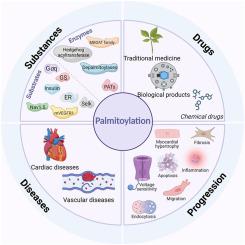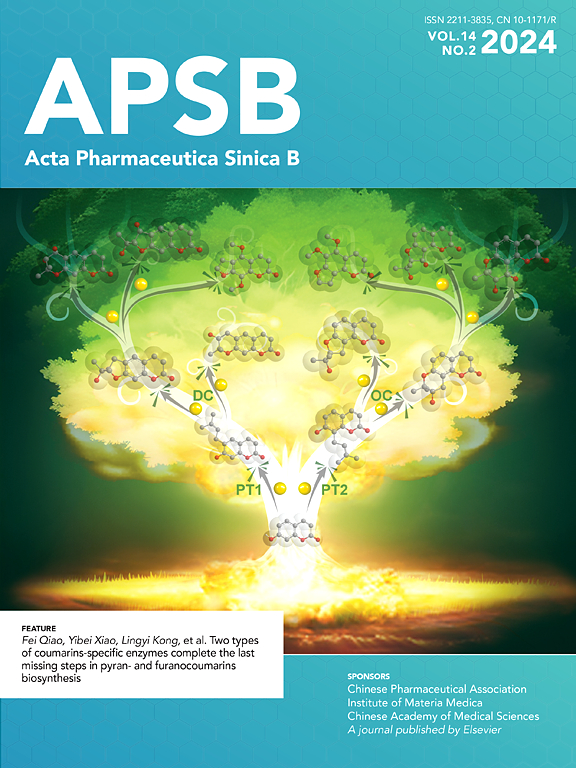蛋白棕榈酰化:心血管疾病的潜在治疗靶点
IF 14.6
1区 医学
Q1 PHARMACOLOGY & PHARMACY
引用次数: 0
摘要
棕榈酰化是脂肪酸(通常是C16棕榈酸酯)与蛋白质中半胱氨酸残基的共价结合,对调节蛋白质功能和酶活性至关重要。这种脂质修饰促进了蛋白质在细胞膜上的锚定,决定了它们的亚细胞分布,并影响了蛋白质的运输动力学和细胞内定位。此外,它还通过泛素-蛋白酶体系统调节蛋白质降解。棕榈酰化通过调节底物、促进额外的翻译后修饰以及与其他分子改变相互作用,参与心血管疾病的发病和进展。此外,关注棕榈酰化过程的干预策略有望为心血管疾病提供新的治疗途径,并解决临床环境中存在的挑战。本文从棕榈酰化的调控功能、催化酶和相关底物等方面综述了棕榈酰化在心血管疾病中的作用和重要性。它强调了最近发现的棕榈酰化靶向治疗与心血管健康的联系,并探讨了心血管治疗的潜在方法和未来的挑战。本文章由计算机程序翻译,如有差异,请以英文原文为准。

Protein palmitoylation: A potential therapeutic target in cardiovascular diseases
Palmitoylation, an essential covalent attachment of a fatty acid (usually C16 palmitate) to cysteine residues within proteins, is crucial for regulating protein functionality and enzymatic activities. This lipid modification facilitates the anchoring of proteins to cellular membranes, dictating their subcellular distribution and influencing protein transport dynamics and intracellular positioning. Additionally, it plays a role in regulating protein degradation through the ubiquitin-proteasome system. Palmitoylation is implicated in the pathogenesis and progression of cardiovascular diseases by modulating substrates and prompting additional post-translational modifications, as well as by interacting with other molecular alterations. Moreover, an intervention strategy focusing on palmitoylation processes is anticipated to offer novel therapeutic avenues for cardiovascular pathologies and address extant challenges in clinical settings. This review consolidates current research on the role and importance of palmitoylation in cardiovascular diseases by exploring its regulatory functions, the catalyzing enzymes, and the involved substrates. It highlights recent discoveries connecting palmitoylation-targeted therapies to cardiovascular health and examines potential approaches and future challenges in cardiovascular treatment.
求助全文
通过发布文献求助,成功后即可免费获取论文全文。
去求助
来源期刊

Acta Pharmaceutica Sinica. B
Pharmacology, Toxicology and Pharmaceutics-General Pharmacology, Toxicology and Pharmaceutics
CiteScore
22.40
自引率
5.50%
发文量
1051
审稿时长
19 weeks
期刊介绍:
The Journal of the Institute of Materia Medica, Chinese Academy of Medical Sciences, and the Chinese Pharmaceutical Association oversees the peer review process for Acta Pharmaceutica Sinica. B (APSB).
Published monthly in English, APSB is dedicated to disseminating significant original research articles, rapid communications, and high-quality reviews that highlight recent advances across various pharmaceutical sciences domains. These encompass pharmacology, pharmaceutics, medicinal chemistry, natural products, pharmacognosy, pharmaceutical analysis, and pharmacokinetics.
A part of the Acta Pharmaceutica Sinica series, established in 1953 and indexed in prominent databases like Chemical Abstracts, Index Medicus, SciFinder Scholar, Biological Abstracts, International Pharmaceutical Abstracts, Cambridge Scientific Abstracts, and Current Bibliography on Science and Technology, APSB is sponsored by the Institute of Materia Medica, Chinese Academy of Medical Sciences, and the Chinese Pharmaceutical Association. Its production and hosting are facilitated by Elsevier B.V. This collaborative effort ensures APSB's commitment to delivering valuable contributions to the pharmaceutical sciences community.
 求助内容:
求助内容: 应助结果提醒方式:
应助结果提醒方式:


